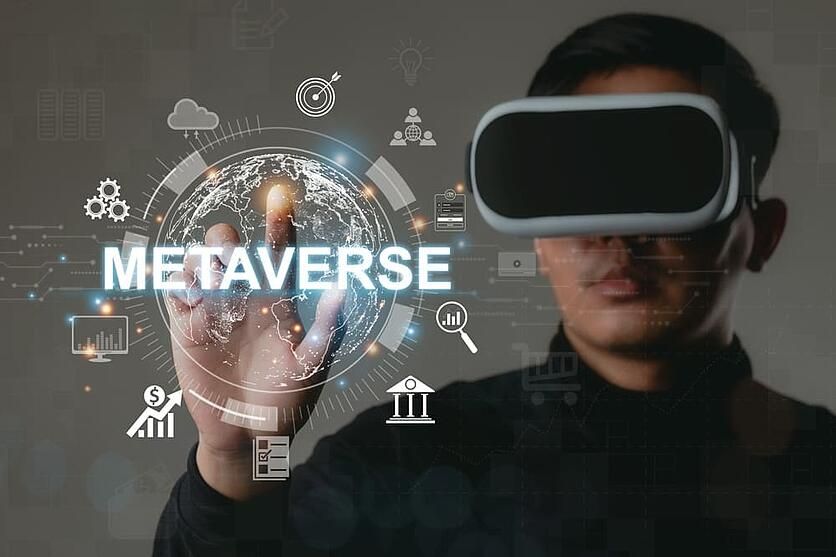The Role of the Metaverse in Digital Marketing

Summary: Is the metaverse included in your digital marketing plan? Because if it isn’t, you’re missing out! Global brands, art dealers, and even rappers are active in the metaverse. Read on to see if you’re being left behind.
The metaverse is quickly becoming an essential element of digital marketing.
Coca-Cola sold its first-ever NFT (Non-Fungible Token) collectibles in 2021, with proceeds benefiting Special Olympics International—and the winning bid in the online auction came in at $575,884 USD. And Coca-Cola is not alone; other major brands expanding into metaverse platforms include names like Samsung, Nike, Adidas, Gucci, Louis Vuitton, Burberry, and the auction house Sotheby’s.
(FYI, you can dive deeper into how brands are adopting the metaverse in our co-founder’s presentation at a recent Springboard event!)
While video games currently account for most metaverse activity, the most popular non-gaming activities within video games are virtual recreations of social and life events. According to research, 28% of adults globally are interested in attending virtual music concerts. Fortnite, Roblox, The Sandbox, and Decentraland are where future customers will be attending weddings, birthdays, graduations, and concerts.
So while there is definitely a use case for the metaverse, do you know enough about your audience to know whether they’re exploring it for themselves? Because if yes, then Metaverse advertising should undoubtedly be a part of your digital marketing strategy.
What Is Metaverse Marketing?
To understand metaverse marketing, one must know the metaverse and who the audience is.
So, what is the metaverse? It is an extended reality where physical and digital worlds merge to influence the way people shop, socialize, learn, play, work, and communicate with each other. People are represented in the metaverse by their avatars, a digital version of themselves. According to a survey of companies already invested in the metaverse, the majority target audience is Millennials, Gen Z, and males.
Source: Why you should care about Facebook’s big push into the metaverse
How do you market to a digital environment that is always active, open to anyone, and filled with user-generated content? According to Dr. Louis B. Rosenberg, a pioneer in augmented and virtual reality and artificial intelligence, marketing in the metaverse should be natural, personal, and intuitive. This type of marketing will transition away from flat media, such as text, images, and video, to immersive media, where natural and intuitive experiences are injected into a user’s environment. Advertising might take the form of Virtual Product Placements (VPPs) and Virtual Spokespeople (VSPs).
Innovative Ways to Use The Metaverse
According to McKinsey, consumers tend to see brands present in the metaverse as innovative, so the standards for delivering innovative experiences are high.
Source: Starbucks details its blockchain-based loyalty platform and NFT community, Starbucks Odyssey
Marketing communications in virtual worlds are different. Users want an immersive experience involving the content in the first person, a personal experience rather than the third-person role they play in the current digital marketing environment. What are some of the innovative ways you can use the metaverse?
Virtual billboards. Place advertisements on virtual billboards and offer branded installations and events with which users can interact.
Make collectibles available. In the earlier example, Coca-Cola made NFT collectibles available. Since we know people like collecting things in the real world, offer assets or limited edition items they can only collect in the metaverse.
Do Virtual Product Placements (VPPs). VPPs are products shown to a targeted audience at a specific time or place where only they can see it, even if there are people around them in the virtual world.
Use Virtual Spokespeople (VSPs). VSPs are artificial intelligence-driven avatars that engage with users in a promotional conversation.
Create experiences with existing communities. Because the metaverse is a natural, personal, immersive space, co-create experiences with existing communities active in your target metaverse.
When a brand intends to play a role in the metaverse, it should proactively plan for risks by establishing basic rules of engagement in the beginning. In the metaverse, events happen in real-time and are more immersive, so everyone must be clear about what the rules are around user safety, misinformation, data privacy, intellectual property management, and customer experience.
Experimenting Is Key
The rapper Snoop Dogg built his own Snoopverse in The Sandbox, with an NFT collection called “The Doggies,” a choice of avatars, special passes, a game, and even a music video taking place in the universe. Promotional content and marketing strategies created for the metaverse must be unique, and experimenting is key to finding what works for your brand.
Design experiences that appeal to your target audience, but define how best to balance real-world marketing with immersive experiences and real-world activations that complement the metaverse. Research by J.P. Morgan indicates that annually $54 billion dollars are spent on virtual goods. Test different metaverse opportunities to see how digital marketing can generate revenue for your brand by selling the digital version of a product, an NFT, or a real-world activation.
Success in digital marketing is measured by metrics such as the number of visitors, conversions, shares, likes, and more. These metrics are irrelevant in the virtual world, and companies must rethink how marketing success is measured when they enter the metaverse.
The Metaverse Is Here to Stay
The metaverse might seem implausible and unrealistic to some. But the investments by well-known brands, virtual goods sales numbers, the nearly three billion video gamers, and the name-change of Facebook’s parent company to Meta means the metaverse is here to stay. What is expected to happen to support that statement?
- Millennials and Gen Z expect to transact in future virtual worlds as a growing income-earning consumer group.
- Although there are still a lot of technical constraints to overcome before the metaverse becomes fully mainstream, technological advances such as cloud computing and the rapid adoption of 5G are improving access. The production cost of augmented and virtual reality hardware, such as Meta’s Oculus Quest 2 headsets, is also declining.
- Increased influencer marketing by individual content creators on social media means engagement and brand marketing are becoming more consumer-led. These influencers will probably move to the metaverse to create engaging experiences there as well.
SEO and The Metaverse
Google is already adapting to the new search realities with its Google Lens, where an image (instead of words) is used to find a product or service. You can now use augmented reality (AR) to place 3D objects in your own space directly from Search and use Live View in Google Maps, with directions overlaid on top of the view you see. Images are the primary content in the metaverse, and visual search will play a key role in future search engine optimization (SEO), so marketers should start including it in their digital marketing planning.
In Conclusion
WSI is the world’s largest and most experienced digital marketing agency network. We have over 25 years of experience and supported more than 100,000 brands across multiple industries. If you have questions about the metaverse, or anything related to digital marketing, then you can’t go wrong with talking with a WSI expert. Contact us today.
About the Author
Rick spent 20 years in the insurance industry in finance, primarily developing reporting platforms for B & C stakeholders. His ability to speak to consumers of data (managers and analysts) and translate their needs to programmers led him to start his own digital marketing agency in 2004 to develop data driven solutions for business owners.
The Best Digital Marketing Insight and Advice
We are committed to protecting your privacy. For more info, please review our Privacy and Cookie Policies. You may unsubscribe at any time.
Don’t stop the learning now!

10 AI Trends Transforming Business in 2025: Insights from WSI Experts

%20(1).png?width=600&height=338&name=Horizon_Workrooms_Still_6%20(1)%20(1).png)
%20(1).png?width=600&height=291&name=Starbucks-Odyssey_background%20(1)%20(1).png)
